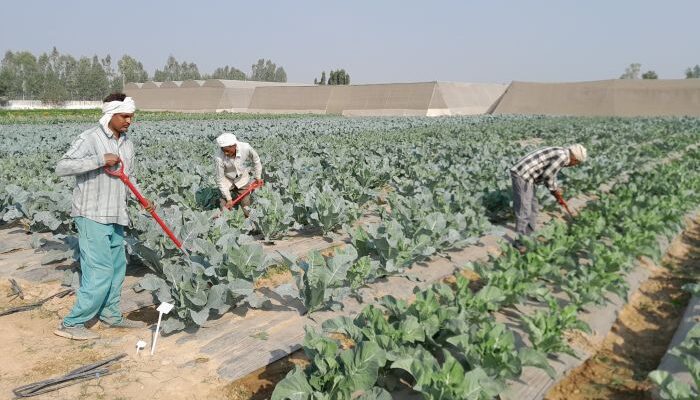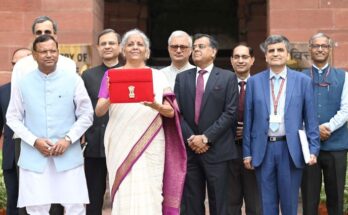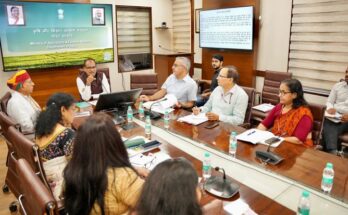Over the years, the agriculture sector has made significant progress and the government’s recent measures have infused a lot of vitality. Now the sector is on the threshold of a quantum jump towards sustainability and resilience. Expectations are running high and Union Budget 2023-24 is expected to create an enabling ecosystem for the sector. It is expected that the Union Budget would have higher allocations and adequate financial provisions to make the farmers future-ready. It is expected that the government would create an enabling and future-ready agriculture ecosystem.
According to experts and agriculture industry captains, the government should consider providing tax relief on crop protection products, farm equipment, seeds and other inputs. The rising input cost has become a major pain point for the farmers.

Underpinning the main expectations of the sector, KC Ravi, Chief Sustainability Officer, Syngenta India, says, “Union Budget should have higher allocations and adequate financial provisions to make the farmers future-ready. An enhanced outlay for PM-KISAN will also ensure the farmers get more liquidity to buy inputs. The industry is also expecting the government should devise a special Production Linked Incentives (PLI) scheme for the agrochemical sector which will have a spiralling effect on boosting manufacturing in India.”
The Indian crop protection industry is a major contributor to the country’s agriculture sector, providing essential products and services to boost and protect agricultural produce. However, the industry has been facing a number of challenges in recent years, including increased competition from cheaper imports, regulatory hurdles, and a lack of investment in research and development. Agrochemicals are excluded from the PLI scheme that is resulting in delays in new investments. In light of these challenges, the industry is hoping for positive announcements of schemes, regulatory and tax concessions that will support the growth of domestic agrochemical manufacturers.
You may also like to read – Budget 2023: Agriculture sector expects incentives for new technologies and innovations – Part – 1

Vimal Kulshrestha, President – Crop Protection, Hikal says, “We think that government should restrict and regulate the import of agrochemical formulations into India, which can be manufactured in India from the locally manufactured agro actives and enough capacity is available with Indian manufacturers. This will benefit India by reducing its foreign exchange usage. It will also boost the government’s ‘Make in India’ efforts. The Indian agrochemical industry is poised to make domestic products that can be imported to the world to contribute to the country’s export economy.”
“Another key area of concern is the need for increased investment in research and development. The industry is looking for measures that will encourage investment in R&D to create new products and improve existing ones. The government’s support in this area will help the industry to stay competitive. Overall, the crop protection chemical industry in India is hoping for a budget that will support the growth and development of the sector, addressing the challenges it currently faces and providing the necessary resources to help it succeed in the future,” Kulshrestha adds.
New and emerging technologies such as drones and artificial intelligence (AI) are proving to be game-changers. The sector is anticipating further impetus to the use of technology including drones. “The proposed digital crop survey shall enable a shift from the old Patwari system to a more robust AI/ML and GIS-GPS for driving the mapping of cropland. This will not only benefit the Government but also the private industry. We are expecting some announcements in the Budget on this,” adds Ravi.
You may also like to read – Budget 2023: CropLife India urges Govt to bring GST rate cut in agrochemicals to benefit farmers
Diversification of agriculture needs to be promoted in a mission mode in order to deal with increasing pressures from climate change, soil erosion, biodiversity loss, and depleting water tables. Funding and financing in the sector are critical issues.

“It is expected that the FY23–24 Union Budget would significantly emphasise private sector investment to help farmers protect their crops from the effects of climate change. The government might relax regulations to make investing easier for the private sector. The government needs to pay attention to shortcomings in the post-harvest infrastructure too. The government should prioritise effective warehouse management, and expanding finance availability will aid farmers in safeguarding their harvest from external threats,” recommends Ashok Prasad, Co-Founder & CEO, Unnati, an agritech company.

The government also needs to focus on allied sectors like aquaculture. Rajamanohar Somasundaram, Founder & CEO, Aquaconnect, says, “Although aquaculture carries high production risks, unlike agriculture farmers, fish and shrimp farmers are yet to get subsidies on insurance premiums. Lack of subsidy on insurance premiums demotivates the farmers from availing any risk mitigation for their crops, as this adds up the production cost significantly. The government support on premiums will help farmers to a great extent to mitigate production risks.”

Echoing similar views, Tarun Arora, Director of Single Family Office, IG International suggests, “The government should come up with a liberal allocation for setting up post-harvest facilities. By incentivising private investment and channelling agritech investments through government-led initiatives, the industry can propel growth and the economy. The same can be replicated for cold storage and cold chain logistics as well.”
“The industry expects there to be greater allocations and incentives that can be a game-changer for the fruit industry, especially at a point where climate change is increasingly threatening the food supply. To make us resilient and for a smooth transition to sustainable agriculture, we urge the government to make adequate budget allocation so that it covers even the smallest of the farmer as well. There is huge potential in the agri industry and a sound financial policy can unleash the agri boom,” adds Arora.
You may also like to read – Agriculture needs to get strengthened for being climate-resilient
The agritech sector is integral to India’s agriculture sector’s efforts to compete globally. While the government has taken many initiatives to support the industry over the last two years, it is time to focus on promoting its growth.

Amith Agarwal, Co-founder & CEO, Agribazaar, says, “The landscape is ripe for innovation as the pandemic accelerated digital adaptation among farmers at an unprecedented rate. Consequently, a large share of farmers integrated technology into their businesses. Technology this objective, the Union Budget 2023 should allot tax breaks and extend monetary incentives such as subsidised credit facilities, and interest rate subvention to agritech enterprises. Such a move will go a long way in enabling the companies to smoothen their business objective of building a more resilient agri-ecosystem for the nation.”
The government is expected to create an enabling agritech ecosystem too with growth-oriented. Encouragement and incentives to agripreneurs would bridge the infrastructure and supply chain gaps in the existing agri-ecosystem by building facilities, investing in storage infrastructure, and providing last-mile connectivity.




